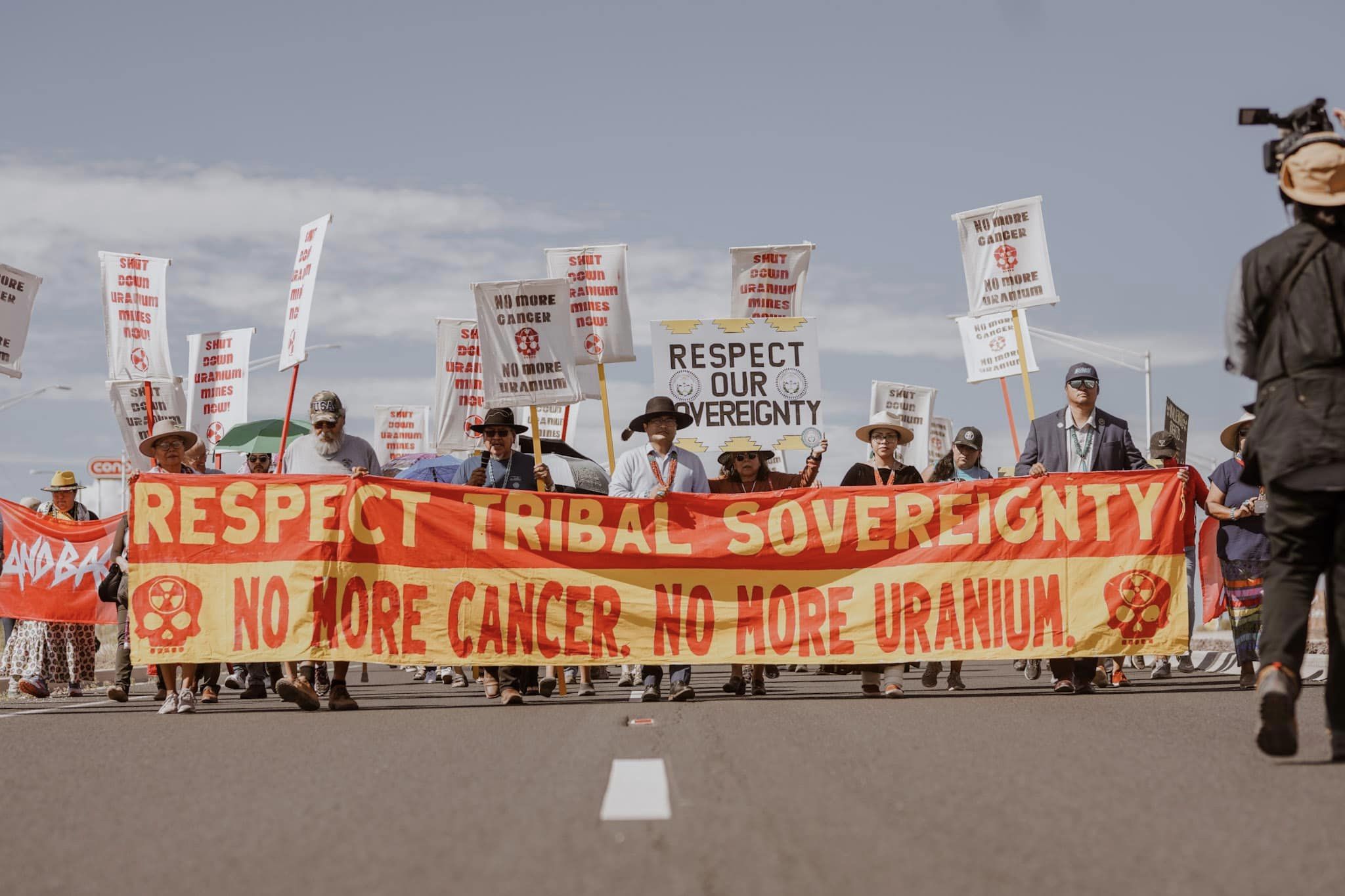
- Details
- By Donovan Quintero
WINDOW ROCK, Ariz. — A peaceful demonstration against the illegal hauling of uranium ore took place in Cameron, Arizona, on Friday on the Navajo Nation. The event, led by Navajo Nation First Lady Jasmine Blackwater-Nygren, drew attention to the recent actions of Piny Plain Mine, which reportedly failed to provide the required notification to the Navajo Nation regarding its transport of uranium ore.
Participants gathered early in the morning, holding signs that read “Shut Down Uranium Mines Now!” As the crowd walked toward the Cameron Chapter House. Before the walk, tribal leaders expressed their deep concerns about the health risks associated with uranium transportation and the legacy of environmental damage caused by mining activities on their lands.
Speaking to the gathered crowd, First Lady Blackwater-Nygren emphasized the importance of community unity in the face of such violations.
“We've heard a lot of powerful words, a lot of powerful messages here this morning, and I want to echo that we heard from our council delegate,” she said. “I think the resounding message that we all hear today is that we are standing united, all of us across the nation; that we don't want this uranium being hauled through our communities.”
For First Lady Blackwater-Nygren the issue is personal. She said she lost her grandparents to cancer caused by uranium exposure.
“They're down winders,” she said. “I'm from Northern Navajo. So all the way from the north, to the east, to the west, we're all deeply affected by uranium.”
President Nygren said the demonstration served as a reminder of the longstanding issues the Navajo Nation has faced due to uranium contamination, including health issues stemming from mining operations that occurred during the Cold War era.
“Those are the people that have been affected by cancer, disease, respiratory issues, and have lost loved ones. Those are the ones that are affected every day. They're struggling on a day to day basis” he said.
Nygren said he Pinyon Plain Mine disrespected the Navajo Nation when they began transporting uranium ore on Tuesday without giving proper notification.
“I got no notification as president of the largest tribe in America, twenty-seven thousand square miles, over four-hundred thousand people and you're gonna disrespect our lands or laws in the things that we all represent as a nation,” he said.
President Nygren signed an executive order on Wednesday that calls for stricter enforcement of regulations that govern the transportation of hazardous materials across tribal lands.
The executive order halts uranium ore from being transported through the Navajo Nation for six months, which will give the tribe and Pinyon Plain Mine ample time to discuss how they can better work together.
“(For) Six months, there's gonna be no hauling uranium through the Navajo Nation. So, this kind of gives the opportunity for parties to come back together and to have this discussion,” said President Nygren on Thursday.
The peaceful march ended at the Cameron Chapter House, where community members addressed leaders and discussed plans to escalate advocacy efforts against illegal mining practices.
President Nygren said the demonstration highlights the ongoing struggle for environmental justice within the Navajo Nation.
The Department of Energy Office of Legacy Management has identified the tribal lands where defense-related uranium mines are found. The vast majority—96 percent—are on the Navajo Nation.
The remaining 14 mines are located on the lands of the Hualapai Tribe, the Pueblo of Laguna, the Pueblo of Zuni, the Spokane Tribe of Indians, the Tohono O'odham Nation, and the Ute Indian Tribe.
More Stories Like This
NCAI Passes Two Emergency Resolutions on Immigration Enforcement ActivitiesChickasaw Lighthorse Police Officer named Indian Country Law Enforcement Officer of the Year
Indian Gaming Association Rallies Broad Coalition Against Sports Event Contracts It Calls Illegal Threat to Tribal Sovereignty
Navajo Resources and Development Committee Issues Notice on Livestock Inspection Requirements
American Prairie, Tribal Coalition Files Protest Over Rescinded Grazing Rights
Help us defend tribal sovereignty.
At Native News Online, our mission is rooted in telling the stories that strengthen sovereignty and uplift Indigenous voices — not just at year’s end, but every single day.
Because of your generosity last year, we were able to keep our reporters on the ground in tribal communities, at national gatherings and in the halls of Congress — covering the issues that matter most to Indian Country: sovereignty, culture, education, health and economic opportunity.
That support sustained us through a tough year in 2025. Now, as we look to the year ahead, we need your help right now to ensure warrior journalism remains strong — reporting that defends tribal sovereignty, amplifies Native truth, and holds power accountable.
 The stakes couldn't be higher. Your support keeps Native voices heard, Native stories told and Native sovereignty defended.
The stakes couldn't be higher. Your support keeps Native voices heard, Native stories told and Native sovereignty defended.
Stand with Warrior Journalism today.
Levi Rickert (Potawatomi), Editor & Publisher

